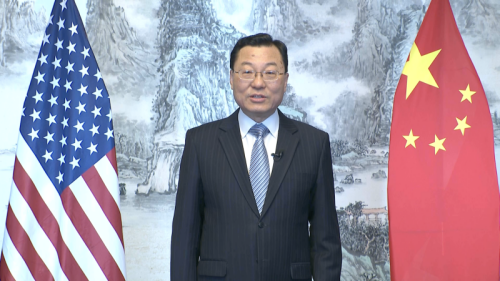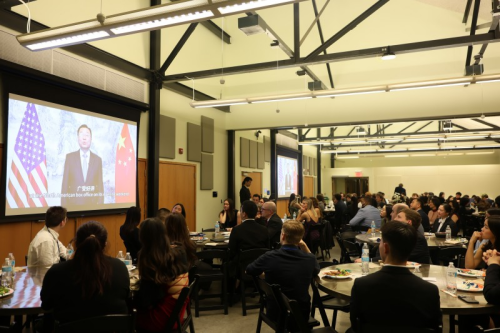
People’s Republic of China



February 28, 2025
President David Firestein,
Mayor Leonardo Williams,
Executive Director Min Fan,
Dear students,
It gives me great pleasure to attend the 2025 Duke-UNC China Leadership Summit via video link. I still cherish the fond memories of visiting Duke University over 10 years ago and discussing the international situation and China-U.S. relations with the students. While I cannot join you in person today as I am attending the annual “two sessions” in Beijing, I am glad to see so many young friends continue to care for China-U.S. relations.
We are living in a world more fluid and turbulent than before. The China-U.S. relationship is again at a new important juncture. Therefore, the theme of this summit, “Bridging the Pacific: Charting the Course of U.S.-China Relations”, cannot be more relevant. Over the past five decades, we have seen our economies becoming deeply intertwined with one another, and our people visiting each other more often. Bridges one after another have connected China and the United States across the Pacific, leaving us deeply interwoven. At the same time, economic and trade cooperation, which serves as a ballast of the relationship, is being rattled by protectionism. People-to-people exchanges are being increasingly strained by a chilling effect. The steady and sustainable development of China-U.S. relations is facing grave challenges. It is more important than ever for us to reflect and rebuild the bridges, and enhance the foundation for and inject impetus into the relationship.
We need to focus on our common interests, and build more bridges for cooperation. Two-way trade between China and the U.S. last year exceeded 680 billion US dollars. Around 73,000 American companies are investing in China. China is in the top 3 export markets for 32 American states, including North Carolina. The extensive common interests we share and the vast room for cooperation we enjoy are there for everyone to see. Any attempt to decouple and disrupt supply chains would cause a heavy blow, and any trade war or tariff war would inflict greater injury on oneself than others.
As early as in 2019, China became the first country in the world to officially schedule fentanyl-related substances as a whole class. The progress in China-U.S. counternarcotics cooperation in recent years has also been widely recognized. Wielding the baton of tariffs on the pretext of the fentanyl issue would only be counterproductive. The latest CBS news poll showed that about 75% of the U.S. respondents believe the new tariffs would only make the prices higher.
The shared aspiration of our peoples for a better life is unstoppable. The two sides need to bear in mind the mutually beneficial nature of our bilateral relationship, and get more big things done, to the benefit of both our countries and the world.
We need to shoulder our common responsibility, and build more bridges for peace. Currently, global challenges keep emerging, and hotspot issues constantly flare up. As permanent members of the UN Security Council, China and the U.S. need to live up to our responsibility as major countries, uphold peace, development and cooperation, and say no to hegemonism, unilateralism and protectionism.
As the new round of scientific and technological revolution and industrial transformation is unfolding, what we need is not a technological blockade, but “deep seeking” for human progress. Meanwhile, emerging high technology like AI could open “Pandora’s box”, and global competition, if left unchecked, could bring “gray rhinos”. Last year, China and the U.S. co-sponsored each other’s resolutions on AI at the UN General Assembly, and affirmed the need to enhance international cooperation. We need to continue to jointly promote AI for good, improve global governance, and safeguard world peace.
We need to establish a common vision, and build more bridges for friendship. When I spoke at Duke over 10 years ago, one of the students asked me how to keep the pandas in the U.S. I am happy to share with all of you that four new pandas settled down in San Diego and Washington D.C. last year. Also, earlier this year, the National Ballet of China staged seven performances of the dance Chinese New Year in the U.S., all of which drew a full house. Chinese animated blockbuster “Ne Zha 2” has been well received by the American audience, and entered the top five at the North American box office on its opening weekend. All these have again proven that the enthusiasm of our peoples for greater exchanges, cooperation and friendship simply cannot be dampened. In the past year, around 16,000 young Americans visited China under President Xi Jinping’s initiative to invite 50,000 American youths in five years. As China offers visa-free policy to more countries, citizens from 54 nations, including the U.S., can stay for up to 240 hours in China during transit without a visa. We hope the U.S. side will also move with us in the same direction and encourage more visits and exchanges between our two peoples, so that we can jointly write more stories of goodwill.
It needs to be pointed out that it is both an obligation and a must for China and the U.S., as two major countries, to achieve long-term peaceful coexistence on this planet. On January 17, President Xi Jinping and President Donald Trump had a phone call and reached a series of important common understandings, which have pointed out the direction and set the tone for China-U.S. relations. We hope the U.S. side will work with China in the same direction, follow through on the common understandings reached between our heads of state, maintain communication, manage differences and expand cooperation in accordance with the principles of mutual respect, peaceful coexistence and win-win cooperation, so as to advance the steady, healthy and sustainable development of China-U.S. relations.
The U.S. side needs to establish a correct perception toward China. If we see each other as a rival and engage in a race to the bottom, neither of us would be a winner, and the world would suffer. If we choose to be each other’s partner and help one another succeed, we can prosper together, with the whole world benefiting from it.
The pressing priority is that the U.S. side should earnestly abide by the one-China principle, properly handle the Taiwan question in accordance with the three Sino-U.S. Joint Communiques, resolutely oppose “Taiwan independence”, stop upgrading its substantive relations with Taiwan, and stop helping Taiwan expand its so-called “international space”. Trying to contain China with Taiwan would only invite trouble for oneself.
Dear students,
This year marks the 80th anniversary of the victory of the Chinese people’s war of resistance against Japanese aggression and the World Anti-Fascist War. During WWII, China and the U.S. fought side by side for peace and justice, and our two peoples forged a friendship amid the trials of blood and fire. Today, whether China and the U.S. can together fulfill our responsibility for world peace and development bears on the well-being of both our peoples and the future of humanity. Ultimately, this depends on what each of you, my young friends, believe and do. It is my hope that you will continue to take an active part in the “50,000 in five years” initiative, reach out to and make friends with your peers in China, and encourage our two countries to respect one another with empathy, manage differences in awe, and expand cooperation with a sense of mission, so as to enhance the foundation and build more bridges for a stable, sound and sustainable China-U.S. relationship.
Thank you very much.



